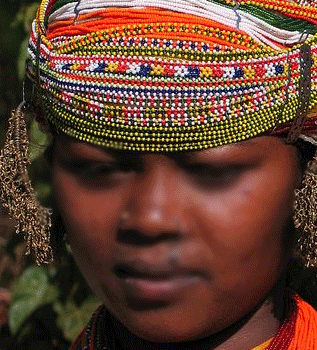Bhubaneswar: A large number of people belonging to different tribal communities of Odisha have been hit by the second wave of the COVID-19 pandemic, prompting a concerned state government to pay special attention to safeguard them.
By Friday evening, there are reports of 44 members of the Particularly Vulnerable Tribal Group (PVTG) getting infected with COVID-19, Project Director of Odisha PVTG Empowerment and Livelihood Improvement Program admits.
The tribals constitute 22.8 per cent of the states population.
Of the 62 tribal groups living in Odisha, 13 have been identified as PVTG in view of their dwindling numbers and therefore given special protection.
The number of PVTG in Odisha is only 2.14 lakh. “By Friday evening, we had reports of 21 members of the PVTG getting infected with COVID-19.
Asked how the PVTG members could get infected, the official said that though they live on hill tops or dense forests, some of them visit the local weekly haats (market) to sell their forest produce.
“They might have got infection while mingling with people in the plains”, he reasoned.
The State Government has meanwhile stopped the weekly markets in view of the surge in COVID-19 cases.
The government has asked the field level officials to keep a vigil over members of the PVTG as their lives are precious for Odisha, he said.
The official said that awareness campaigns are being held in PVTG villages through local peer leaders and they are given information in their local languages. The field staff also distribute masks among the PVTG communities, he said.
The official said the 44 people who have been tested positive for the virus belonged to Bonda, Dongaria Kondh, Kutia Kondha Didiya, and Saura.
A report from undivided Koraput district said that four members of PVTGs Dongria Kondh living in the Niyamgiri hills of now Rayagada district, have tested positive on Thursday. They are mostly confined to their village under the Parsali panchayat in Kalyansinghpur block.
“These people rarely visit local markets in the urban areas. There is a bigger chance of getting infection from local weekly markets.
“We have taken precautionary measures to ensure that the disease doesnt spread in the villages in which the community resides,” Rayagada District Collector Saroj Kumar Mishra said.
The Collector said a weekly door-to-door health survey is being conducted by the field staff in their villages and treatment is being provided, if necessary. Two members of the Bonda PVTG in Malkangiri district are also among the 21 people so far infected, he said, adding that the government is taking a close vigil on the situation.
Though Kalahandi and Nuapada district bordering Chhattisgarh, houses some members of the PVTGs Dongaria Kondh, they remained unaffected as they live inside the Sunabeda sanctuary, an official said. The official admit that there is no clear picture on the spread of infection in other groups.
The states PVTG are named as Bonda, Birhor, Chuktia Bhunjia, Didayi, Juang, Kharia, Dongioria Khond, Kutia Knond, Lanjia Saora, Lodha, Mankidia, Paudi Bhuyan and Saora.
Apart from the PVTGs, a large number of tribal people like the rest of the population have contracted the contagion.
Revenue and Disaster Minister Sudam Marndi, a tribal, has tested positive and is undergoing treatment at a private hospital in Bhubaneswar.
Chief Minister Naveen Patnaik enquired about the health of the minister and instructed the hospital to take proper care of Mr.Marndi.
Mayurbanj MP Bisweswar Tudu, a prominent tribal leader, who had also fallen victim to the virus, has recovered and was discharged AIIMs, Bhubaneswar recently.


